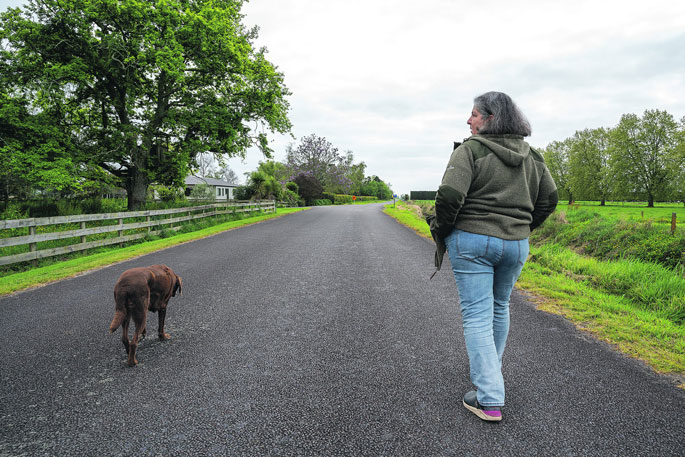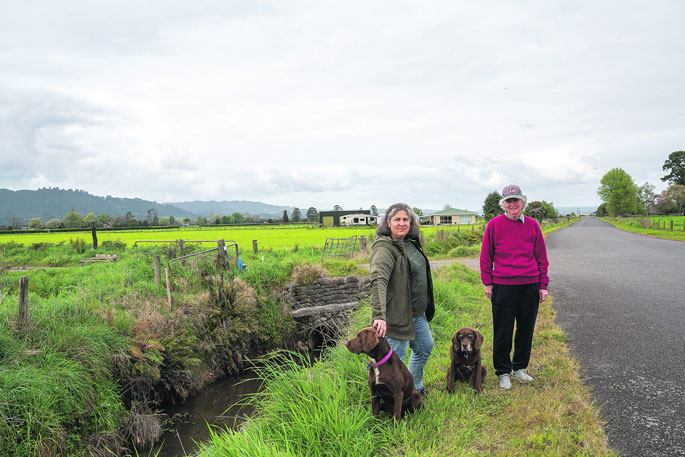Putiki Road residents who agreed to a solar farm across the road from them in 2021 are having second thoughts since changes have been made to the consent application.
Joachim and Joanne Spod are unhappy about Far North Solar Farms’ new plans for its Omeheu solar farm, expected to begin construction on a 30 hectare area of land between Western Drain and Putiki roads in November.
Their main concern is that the main service entrance has been relocated to the narrow, unlaned Putiki Road, rather than Western Drain Road, as originally planned.
They are also concerned screening plants, which they were told would be planted well before construction to maintain their rural outlook, have not yet been planted.
Since they consented to the project, the even larger 207-hectare Genesis Energy solar farm has been developed nearby, with plans to run power pylons along Putiki Road.
They fear they will soon be overlooking hectares of solar panels and be hemmed in by power pylons rather than the green outlook they were promised.
“We moved here 16 years ago for the rural lifestyle,” Mrs Spod said. “All that’s going to be destroyed.”
Mr Spod said residents had been approached at their homes by Far North general manager John Andrews in 2021, who assured them access to the solar farm would be on Western Drain Road and screen planting would be done well ahead of construction.
However, when Far North Solar Farms applied for a consent variation in August this year, the residents were not consulted first.
Mrs Spod said they had had no idea when they originally consented to the plans, that they could be changed without them being informed. It was up to the council to decide whether the changes were acceptable.
Whakatāne District Council resource consents manager Mike Avery said the consent variation had not yet been granted. The variation included changes to the earthworks requirements, and a different laydown area and entrance.
The council was seeking further information about the changes, including a traffic impact assessment to gauge the effect of increased heavy traffic on Putiki Road.
“Once we have that we with be able to assess if there are any affected persons or if the variation needs to be publicly notified,” Mr Avery said.
“Far North have been good to deal with and have been quite up front on this. I’m not anticipating any great difficulty with this. How it proceeds really depends on the effects identified from the traffic impact assessment.”
Mr and Mrs Spod said Putiki Road was already heavily used by a preschool with up to 60 children being dropped off and picked up daily, farm vehicles, trucks, herds of cattle, cyclists and dog walkers. The Awakeri School bus also stopped in several places along the road. As a two-lane thoroughfare, Western Drain Road was more suitable as an access point.
They and their neighbours Peter and Robyn Askey are also concerned about the lack of planting.
Consent conditions require that screening plants of a minimum of one metre in height be planted between March and September following the start of construction.
As an official blessing and naming of the site took place in April, Mrs Spod said she was disappointed planting had not yet happened.
“They told us they had ordered the plants but then they turned around and cancelled the order.”
Mr Avery said the council routinely monitored the site and no construction had begun that would trigger those consent conditions. Nothing could be done until the revised consent had been approved.
At a public meeting in Whakatāne, on September 18, residents suggested if the planting couldn’t be done this year, an alternative would be to plant two metre high trees next year.
Mr Spod said he had been disappointed with the lack of support from Whakatāne Mayor Victor Luca at the meeting, who he reported as saying “trees only grow a few centimetres a year anyway so what does it matter when it gets done?”.
Dr Luca said he had a different memory of what he said at the meeting, saying he had simply enquired how much the trees would grow in a year.
 Joanne Spod and her husband Joachim (not pictured) feel their rural lifestyle, such as being able to walk their dogs along their road, is under threat from solar farms about to be constructed.
Joanne Spod and her husband Joachim (not pictured) feel their rural lifestyle, such as being able to walk their dogs along their road, is under threat from solar farms about to be constructed.
Mr Spod said when he built a house near the road on his property, the council had been strict that he comply with resource consent conditions to plant screening plants.
“In his capacity as council leader, paid for by us ratepayers, I expect [the mayor] to set the example and hold everybody, both private and commercial interests alike, accountable to the same local district plan rules and consent conditions.
“We understand the need for renewable energy, but we believe that Far North Solar Farms can achieve its goals without jeopardising the safety and quality of life of Putiki Road residents whose rural lifestyles are under significant threat from large solar farm installations.”
Far North Solar Farm communications and engagement lead Greg Hay said changes to the solar farm’s original design included a safer access route for trucks entering the site.
During the process of applying for a new consent, Far North had engaged with neighbours, including those living along Putiki Road about the new resource consent, site access and the traffic route to seek their feedback.
“The views of neighbours and other stakeholders connected to the solar farm development are important to us as the consenting process is finalised, and we will continue to engage with them throughout the solar farm’s development.”
LDR is local body journalism co-funded by RNZ and NZ On Air.




0 comments
Leave a Comment
You must be logged in to make a comment.